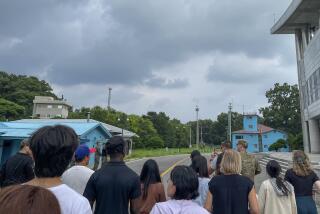Soldier Haunts Town Once Again
- Share via
RICH SQUARE, N.C. — In this town’s cubbyhole Hall of Fame, crowded among newspaper clippings about local war heroes, is a sad little memorial to Charles Robert Jenkins.
It consists of his National Guard helmet liner. Underneath is a plaque that reads “Disappeared in Korea.”
The story behind the helmet is one that many people in Rich Square would prefer to forget: that a seemingly ordinary native of this community, having vanished from his Army unit in 1965, has spent most of his adult life in North Korea, starring in anti-American propaganda films and broadcasts.
For almost 40 years, the subject of Jenkins’ disappearance has been met with pained silences and contemptuous comments. But the curator of the museum, a childhood friend of Jenkins’, decided to include him anyway.
“It was just a matter of saying, ‘Well, here it is,’ ” said Michael Cooke, 60.
The old story resurfaced last month, at the Group of 8 summit in coastal Georgia. Jenkins, 64, has become a well-known and sympathetic figure to the Japanese, who have taken up his cause because, while teaching English in Pyongyang, he married and bore two daughters with a Japanese woman who had been abducted by North Korea as a teenager.
Jenkins’ wife, Hitomi Soga, left North Korea for Japan two years ago, and Japanese authorities are trying to secure the release of her family.
“The issue of Mr. Jenkins is something that deeply concerns us all,” Japanese Prime Minister Junichiro Koizumi told reporters on his way to the summit.
Koizumi asked President Bush to assure Jenkins he would not be court-martialed for desertion if he left North Korea. Though Bush replied that Jenkins was still a wanted man, the Japanese continued to press his case.
The news has met with bafflement in the place Jenkins came from. With the last of Raleigh’s suburbs past, the northeastern part of North Carolina drops off into rural languor. The failing peanut industry has made Northampton County one of the state’s poorest, a place where vacant houses are left to peel, then warp, then collapse to the ground. The population dwindles every year.
The small towns in Northampton County inherited the strict moral code of the English Quakers who founded them. To this day, local controversies can be caught in an echo chamber of interconnected families. Jenkins grew up during a time when bad behavior was judged particularly harshly, said one neighbor.
“Fifty years ago, you were not much if you did not stay within the code. I mean, morally,” said Brett Cooke, Michael’s mother, who is 88. “That put you into another class of people.”
Jenkins grew up in a rented clapboard house by the railroad tracks. There were seven children in the house; they were a respectable family but “dirt poor,” said Ted Tyler, a former state legislator who was several years ahead of Jenkins in school.
The Jenkinses’ redheaded oldest son was known as “Super,” short for “Superman,” which referred to a character trait -- he seemed to compensate for his small stature with an outsize bravado, and was forever showing off his physical strength. Because he had a lisp, his classmates began to call him “Thuper,” a nickname so widely used that friends barely recognize his given name.
He was held back several times before dropping out in eighth grade. He joined the Army at 15, his family said. People who liked him were relieved.
“He wasn’t stupid,” Tyler said. “He just needed circumstances changed in his life.”
Super Jenkins had attracted little notice from the people of Rich Square until 1965, when the government delivered the news that he had left his unit.
The defection, the government reported, had taken place at 2:30 a.m., as Jenkins, a sergeant, was leading a patrol into the demilitarized zone separating North and South Korea. Jenkins told his soldiers he wanted to investigate a noise, and disappeared into the darkness.
There was no word of Jenkins until three weeks later, when soldiers heard his voice in a propaganda broadcast in the DMZ, describing the “Shangri-La” he had found in North Korea.
The news -- and the attention that went with it -- felt shameful to the people of Rich Square. Kids stayed away from the Jenkins family for a while, remembers James Hyman, Jenkins’ nephew, who was 5 at the time.
“It was like somebody had cooties or something -- stay away from them,” Hyman said. Gradually, though, the neighbors began stopping by again.
“My granddad ran the ice house,” Hyman said. “People needed ice.”
The family was quiet about the disappearance. Michael Cooke remembers asking if they had heard from him, and getting an awkward silence. Jenkins’ brother and sister, who live in nearby Scotland Neck, would not comment for this article.
Their silence makes more sense to Cooke now.
“The atmosphere was, ‘How could anybody go over and help the communists?’ ” Cooke said. “It was worse than losing a son. Imagine his mother getting a letter saying: ‘Your son’s a traitor. Goodbye.’ No condolences or nothing.”
At that time, folks in Rich Square would have taken government officials at their word, Cooke said.
“Probably deep down, most everybody, including me, believed he deserted,” he said.
The Jenkins family never believed it, Hyman said. They knew how devoted Robert was to the Army. Particularly fishy, Hyman said, were the farewell letters government officials passed on to the family by telegram. They were signed “Charles,” when everyone knew Jenkins went by “Super” or “Robert.” One was addressed “Dear Mother,” when everyone knew Jenkins called her “Mama.” Copies of the letters were never given to the family.
Jenkins’ nephew has petitioned Bush to grant his uncle a pardon. “They can’t come up with any proof,” Hyman said. “If I die before he dies, I will go to my grave” trying to prove Jenkins was not a deserter.
Hyman, who left Rich Square when he was 15, figures the town was split over the news: Half thought he was a traitor, half thought he had been captured. As the years passed, fewer and fewer people could remember him at all. Journalists visiting town would be met with silence.
But several of Jenkins’ former neighbors said they would turn over the mystery in their minds: Was there something we did not know about him? Could a beautiful young agent have persuaded him to defect? Was he abused by his commanding officer? Was he anxious about rumors of a deployment to Vietnam?
And perhaps the most sensitive question: Is it possible that Jenkins, a high school dropout from one of the town’s poorer families, saw greater opportunities in North Korea than he would have in Rich Square?
“Southern people love to talk,” said Alec Gunnells, 60, from nearby Bertie. “Southern people love to discuss things.”
In his used-car lot, Charles Lassiter, 64, spoke warmly of the boy who repaired cars with him as a teenager. Lassiter never believed Jenkins was a deserter. He’d love to see him again.
“I think about him all the time,” Lassiter said. “I used to enjoy running around with him.”
From others, though, Jenkins would meet with skepticism -- and scorn, said Keith Hoggard, a reporter who has covered news about Jenkins for the Roanoke-Chowan News-Herald.
“If they knew for sure that he did it, that he deserted,” Hoggard said, “they would pull the switch themselves.”
More to Read
Sign up for Essential California
The most important California stories and recommendations in your inbox every morning.
You may occasionally receive promotional content from the Los Angeles Times.













